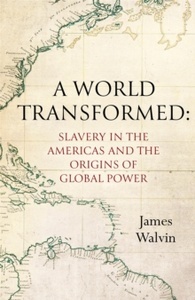World Transformed

Editorial Robinson
Fecha de edición marzo 2022 · Edición nº 1
Idioma inglés
EAN 9781472144348
400 páginas
Libro
encuadernado en tapa blanda
Dimensiones 153 mm x 270 mm
Resumen del libro
How Slavery in the Americas Matters explores how slavery thrived at the heart of the entire Western world for more than three centuries. Arguing that slavery can only be fully understood by stepping back from traditional national histories, this book collects the scattered accounts of the most recent scholarship into a comprehensive history of slavery and its shaping of the world we know. Celebrated historian James Walvin tells a global story that covers everything from the capitalist economy, labor, and the environment, to social culture and ideas of family, beauty and taste.
This book underscores just how thoroughly slavery is responsible for the making of the modern world.
The enforced transportation and labour of millions of Africans became a massive social and economic force, catalysing the rapid development of multiple new and enormous trading systems with profound global consequences. The labour and products of enslaved people changed the consumption habits of millions - in India and Asia, Europe and Africa, in colonised and Indigenous American societies. Across time, slavery shaped many of the dominant features of Western taste: items and habits or rare and costly luxuries, some of which might seem, at first glance, utterly removed from the horrific reality of slavery.
Why Slavery in the Americas Matters traces the global impacts of slavery over centuries, far beyond legal or historical endpoints, confirming that the world created by slave labour lives on today.








